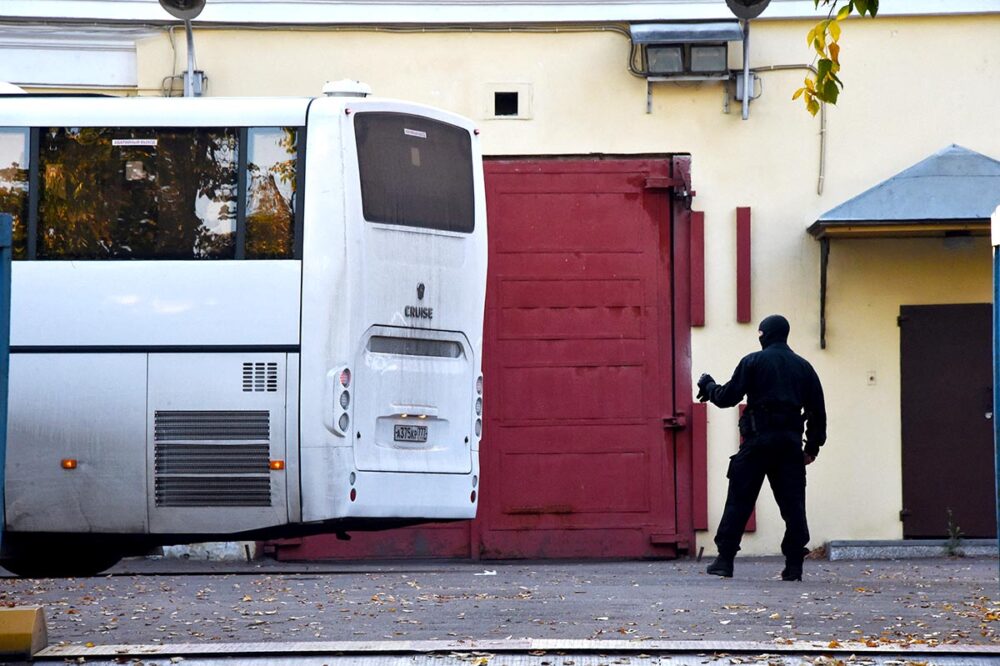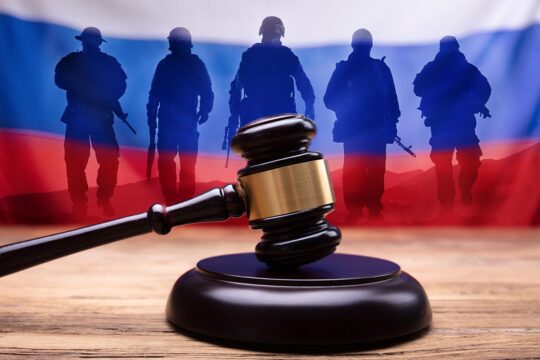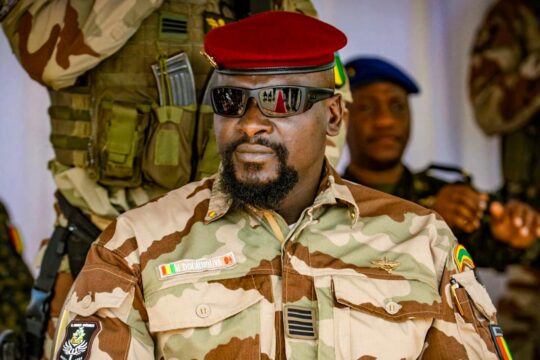On June 24, the defence of Denis Muryga, a former soldier of the Ukrainian “Aidar” battalion, appealed against his sentence. A month earlier, the Southern District Military Court in Rostov-on-Don sentenced him to 16 years in a “strict regime colony” - the second strictest detention regime in Russia, usually applied for a particularly serious crime or after a repeated offence. It differs from the regular regime in terms of the number of allowed visits, parcels, and the amount of money on an inmate's account that they can spend for their needs.
According to Russian investigators, Muryga joined in 2015 the battalion named after the Aidar River in the Luhansk region, in the East of Ukraine, where it was initially deployed. The Supreme Court of the self-proclaimed Donetsk People's Republic (DPR) recognized it as a terrorist and extremist organization in April 2016. It is considered an illegal armed formation in Russia. The 24th Aidar Territorial Defence Battalion was created in May 2014. In September 2014, Amnesty International documented cases of abuses allegedly committed by members of the Aidar battalion of volunteers in Donbass. In 2015, it was incorporated into the armed forces of Ukraine.
Muryga was only accused of undergoing a three-day training course in the battalion, a fact that he admitted. In her appeal, Muryga's defence attorney pleaded for a more lenient sentence, highlighting that the training involved a few hours of medical preparation and guidance on close combat from an instructor. “Firearms were provided only once during the course," stated lawyer Ekaterina Nosalieva during a court hearing on June 6.
Muryga was charged in Russia for “participation in an illegal armed formation” and undergoing training for “terrorist activities”. But these are not the most common charges brought against Ukrainian servicemen in Russia.
Using court websites, judicial statistics, and publications in Russian media for calculations, Justice Info has counted the cases that have been filed to or already tried in courts in Rostov-on-Don, Donetsk, and Luhansk.
Cases involving Ukrainian nationals only began to be submitted to Russian courts this spring. The main hub became the Southern Military District Court in Rostov-on-Don. It has effective jurisdiction over all cases qualified as “terrorism” in the South of Russia and occupied territories in the neighboring country of Ukraine.
18 criminal cases involving 50 individuals
From the start of the full-scale invasion of Ukraine, the Rostov-on-Don Court has received at least 13 criminal cases involving Ukrainians or foreigners considered by Russia as mercenaries. According to the court’s database, these cases involve at least 48 individuals.
In the occupied regions of Ukraine, the court websites do not have the same functionalities as in Russia, making it impossible to count the number of cases against Ukrainian nationals. However, the courts periodically report on cases that have been already considered. The Supreme Court of the self-proclaimed Donetsk People’s Republic (DPR), for instance, issued three sentences in cases that were considered under the Russian laws or after the so-called "referendums" conducted in the republics last autumn.
Before, in one of the earliest and high-profile cases, the Supreme Court of the DPR tried three foreigners. It was heard under the criminal code of the self-proclaimed republic and Justice Info chose not to count it in the present statistics related to proceedings under Russian laws. In that case, the – death penalty – sentence was not executed; the accused were exchanged in September of last year along with other foreigners and 200 Ukrainian servicemen.
On May 31, the Supreme Court of the Donetsk People's Republic, acting on behalf of the Russian Federation, convicted Senior Sergeant Maxim Kondrashev (callsign "Rash"), a member of the "Azov" battalion. According to the Donetsk court, Kondrashev opened fire with an automatic weapon on a minibus carrying refugees on March 2, 2022 in Mariupol near the Azovstal steelworks, resulting in the death of four people. He was sentenced to life imprisonment. Two other members of the Azov battalion, Dmitry Smityi and Artem Bublik, were sentenced by the DPR's Supreme Court, respectively to 15 and 20 years of strict regime colony. Additionally, the Supreme Court of the self-proclaimed Luhansk People's Republic (LPR) sentenced two Ukrainians on charges of state treason and espionage this spring.
Сumulatively, at least 18 criminal cases related to the war in Ukraine involving over 50 individuals have been submitted to courts in Rostov-on-Don, Donetsk, and Luhansk.
In addition to this, according to statistics from the DPR's Armed Forces, two individuals were convicted in the DPR for espionage for Ukraine in 2023, and another 40 were convicted for “crimes against public safety” - a quite vague qualification that includes 27 articles of the Russian Criminal Code (now being applied in the DPR), including the same charges for which Ukrainians are being tried in the Southern Military District Court. Among them are terrorist acts, organization of a terrorist group, and participation in such activities, as well as undergoing training for terrorist activities. This section also includes an article on public dissemination of “knowingly false information” about the actions of the Armed Forces of the Russian Federation. This is a popular article for prosecuting Russians who dissent against military actions in Ukraine. However, the statistics are general, so that it is not possible to determine to whom these verdicts were delivered.
Those who cannot be counted
But in the context of the war, it is impossible to accurately count the number of cases being filed against Ukrainians in Russia, says lawyer Leonid Solovyev, who is affiliated to the Moscow bar association and defends several Ukrainian war prisoners at various stages of the proceedings. Solovyev says he has been involved in about 20 such cases. In total, according to the lawyer's estimation, there could be currently about 100 criminal cases against Ukrainian military personnel ongoing in Russia.
A number of them are held in isolation in Moscow, he points out. This happens in particular in cases related to accusations of espionage. In such cases, detainees are usually held in Lefortovo, the main detention centre of the Russian Federal Security Service (FSB). For instance, it is known that a 25-year-old Ukrainian citizen and Crimean Tatar, Lenie Umerova, is being held there, but no information about her is available. When it comes to espionage cases, information about the detainees is typically not accessible on court websites.
According to official data from the FSB, at least six Ukrainian nationals have been detained during the actual war on charges related to espionage. Four of them were arrested in the occupied parts of Kherson region in Ukraine, one in the Rostov region, and one in Kursk, another Russian region next to the Ukrainian border. Officially, the FSB suspected the six individuals of gathering information about the location and movements of Russian troops and passing it on to Ukrainian military.
What are Ukrainians in Russia accused of?
Since 24 February 2022, the Southern Military District Court of Rostov-on-Don has received 14 cases related to the charge of "violent seizure of power", knowing that the accusation was mainly used still in 2022 against Crimean Tatars. According to Justice Info's calculations, this charge is now and from the start of the year 2023, the most frequently used by Russian authorities in criminal cases against Ukrainian military personnel.
Before, the main defendants in cases related to this charge of "violent seizure of power" were supporters of terrorist organizations such as the "Islamic State". Crimean Tatars, a Turkic ethnic group native to Crimea, were also prosecuted under this charge. They were accused of involvement with the organization "Hizb ut-Tahrir", which Russia has declared a terrorist organization. In annexed Crimea, the persecution of "Hizb ut-Tahrir" members serves as a tool to suppress social solidarity and civil activism among the local population, as stated by the human rights group Memorial, which documented such cases.
During the first part of 2023, the Southern Military District Court received nine cases related to "violent seizure of power", whereas in the entire year of 2022 there were only seven such cases.
"At first, Ukrainians were not detained through the normal criminal procedure; they were abducted. Relatives and human rights defenders struggled to obtain information about the missing individuals, and after 3-6 months, they were discovered in “investigative isolation”. But as the end of the legal investigation period approached, the cases were transferred to the courts, explains Valeria Vetoshkina, a lawyer from the Russian human rights project The First Department, which specializes in criminal cases related to state treason and espionage.
In December 2022, the Ukrainian authorities reported about 3,400 servicemen being held in Russia. But the exact number remains unknown, and most of them are or will probably be exchanged.
Cherednik, first Ukrainian military on trial
As a result, it wasn't until February 15, 2023, that the Southern Military Court received the first criminal case against a serviceman of the Ukrainian Armed Forces (UAF) charged with "violent seizure of power" and cruel treatment of civilians.
The accused in this case is Anton Cherednik, who served in the 501st Battalion of the 36th Marine Brigade of the UAF. According to the accusation, on March 27, 2022, Cherednik stopped two men in the town of Mirnoye near Mariupol and ordered them to lie down on the ground. They showed him identification documents, but the military demanded that they say a phrase in the Ukrainian language. Cherednik reportedly shot one of the men, whose pronunciation was not correct. He partially admitted guilt, agreeing with the fact that he killed a civilian – according to excerpts of his interrogations published by pro-Russian media.
The court in Rostov-on-Don took six months to proceed to the trial of Cherednik, and on July 18, the prosecutor requested a sentence of 17 years of strict regime. On August 9, Cherednik is expected to give a final statement and the Rostov-on-Don court to pronounce its sentence afterward.
Involvement in a “terrorist organization”
The second most frequent accusation faced by Ukrainians in Russia is “terrorism”, often related to their alleged involvement in a “terrorist organization”. One such case filed before the Rostov-on-Don military court involves five residents of Melitopol, located in the territory under Russian control. The accused individuals are contract soldier Igor Gorlov from the Ukrainian Armed Forces, Vladimir Zuev, Andrey Golubev, and Alexander Zhukov from the Ukrainian territorial defence forces, and Yuriy Petrov, who was discharged from the Ukrainian army. Their case was submitted to the Southern Military Court in mid-April.
According to the accusation, the defendants were part of the "Union of ATO [for the Anti-Terrorist Operation Zone, in Ukraine] Participants in Melitopol" and were planning explosions in locations of Russian troops. During one of the initial hearings on July 16, the defendants refused to plead guilty. Only Igor Gorlov confirmed having weapons at home.
Another of the five accused individuals, Golubev, was a well-known kung fu coach in Melitopol, Ukraine. After his arrest, his wife told journalists that on April 6, 2022, armed men dressed in camouflage came to their home. "They took my husband and told him that if he cooperates [with Russia], he will be back soon." For a long time after this incident, Golubev's relatives could not find him, and it was only at the end of August 2022 that Russian media reported he was in the Lefortovo pretrial detention centre, in Moscow.
According to lawyer Solovyev, Ukrainians are more and more frequently accused of committing acts of terrorism. For instance, in Rostov-on-Don, they are prosecuting sergeant Pavel Zaporozhets, a reconnaissance soldier of the Ukrainian Armed Forces, under this charge. According to the accusation, he was planning to carry out an explosion in Kherson on May 9, 2022. Zaporozhets has agreed with part of the accusation but his defence lawyer Oleksiy Ladin contests the legality of the proceeding. Zaporozhets should be treated as a prisoner of war, as he was following a combat order, the lawyer argues.
Fewer cases than officially announced
Last summer, the head of the Russian Investigative Committee, Alexander Bastrykin, stated that more than 400 individuals were implicated in crimes related to events in Ukraine. Over 1,300 criminal cases have been initiated. In May of this year, Bastrykin mentioned the initiation of over 2,900 criminal cases against 716 individuals in connection with crimes committed in Donbas, linked to the war in Ukraine.
However, the courts do not have such a quantity of cases. "Bastrykin's cases are initiated for any event that can be remotely classified as a crime. Even if a rocket lands in a field, for example," explains Solovyev, referring to the trend. "Bastrykin's words should be taken critically. The Investigative Committee initiates cases based on events in Ukraine, but it is unlikely that many of them will reach the court," says Vetoshkina. She also adds that it's difficult for her to estimate the actual number of persecuted Ukrainians. “Some of them are still held in investigative isolation, prisons, and basements in the occupied territories. The state will not voluntarily share such information,” concludes the lawyer.







